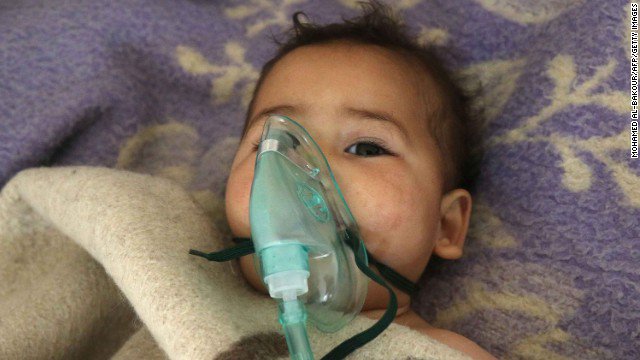
BEIRUT — A chemical attack that killed scores of civilians in Syria likely involved a banned nerve agent, top medical groups concluded Wednesday, as the United States and European allies at the U.N. Security Council demanded a full investigation.
But denunciations at the United Nations faced strong obstacles from Russia, a critical ally of Syria’s government.
Before the Security Council’s emergency session, Russia broke with global consensus that blamed Tuesday’s attack on the Syrian regime and instead claimed it was carried out by Syrian rebel groups. A rebel commander called Russia’s assertion “a lie.”
The Russian stance underscored the difficulties to seek greater international pressures on the government of Bashar Assad as it escalates an air campaign against the remaining antigovernment strongholds in northern Syria.
The attack on the northwestern town of Khan Sheikhoun left hundreds choking, unresponsive, or foaming at the mouth, according to doctors and witnesses who gave harrowing accounts.
The Syrian Observatory for Human Rights, a Britain-based monitoring group, said at least 72 people were killed, making it the deadliest chemical assault since 2013. In that attack, the Syrian government dropped sarin on the Damascus suburbs, killing hundreds of people as they slept and bringing the United States to the verge of military intervention.
Instead, Washington worked with Moscow on an accord to remove Syria’s chemical weapons stockpiles. The latest attack, however, raises questions on whether Syria withheld some chemical agents or later obtained them.
The World Health Organization said that the victims showed symptoms consistent with reaction to a nerve agent. Doctors Without Borders added that medics had treated patients with diluted pupils, muscle spasms and involuntary defecation “consistent with exposure to neurotoxic agents such as sarin.”
Long-standing global treaties have banned the use of chemical weapons, including sarin.
Victims of the attack who had been evacuated to southern Turkey described being enveloped by a fog of chemicals and said that rescue workers had passed out among the people they had come to save.
“Some people died as they were sleeping. The ones who did not, especially the children, were foaming at the mouths and shaking,” said a resident, Hussein al-Nimr. “We tried to rescue people but then we fell down too.”
Turkey’s health minister, Recep Akdag, said that 30 Syrians were taken across the border and treated and they displayed the symptoms of a chemical attack, according to the Haber Turk news channel.
As the U.N. Security Council prepared to vote on a draft resolution condemning the attack and demanding an investigation, Russia attempted to shift the blame onto armed groups opposing Assad.
Maj. Gen. Igor Konashenkov, a Russian military spokesman, said that Syrian warplanes had been targeting rebel workshops on the eastern outskirts of Khan Sheikhoun. “The territory of this storage facility housed workshops to produce projectiles filled with toxic agents,” he said in a recorded statement.
His comments marked a rare admission that airstrikes had taken place in the area. Moscow typically denies involvement in such mass casualty attacks, and has previously falsified video footage in an attempt to exonerate its war planes.
Russia also blamed the 2013 sarin attack on rebels attempting to provoke international intervention.
But Syrian rebel commander Hasan Haj Ali told the Reuters news agency that the Russian assertion was “a lie,” saying the rebels didn’t have the capabilities to produce chemical weapons and there were no military positions in the area bombed, either. “Everyone saw the plane while it was bombing with gas.”
The attack comes amid an upswing in Syrian government strikes against Idlib province, where hundreds of thousands of civilians have fled to from other battle zones around the country.
Doctors and activists across rebel-held areas say there has been an upsurge in chemical attacks by government warplanes since the end of last year. The Syrian Network for Human Rights monitoring group said Wednesday that it had recorded nine separate attacks since the start of the year.
The Syrian government has denied any involvement in Tuesday’s attacks or using chemical weapons. Calling them a “moment of truth” for Syria, U.N. Secretary General António Guterres said he hoped it would result in action by those who have influence on the conflict.
“The horrific events of yesterday demonstrate that unfortunately war crimes are going on in Syria, that international humanitarian law remains being violated frequently.”
(c) 2017, The Washington Post · Louisa Loveluck, Zakaria Zakaria

